Science Quotes by Claude Lévi-Strauss (7 quotes)
Le savoir scientifique avance à pas trébuchants, sous le fouet de la contention et du doute.
Scientific knowledge advances haltingly and is stimulated by contention and doubt.
Scientific knowledge advances haltingly and is stimulated by contention and doubt.
— Claude Lévi-Strauss
Original French in Mythologiques, Vol. 1, Le Cru et le Cuit (1964), 15. As translated by John and Doreen Weightman, The Raw and the Cooked (1969, 1990), 7. A more literal translation could be: “Scientific knowledge advances with stumbling steps, under the whip of contention and doubt.”
N’oublions pas non plus qu’il ne saurait exister pour la science des vérités acquises.
Nor must we forget that in science there are no final truths.
Nor must we forget that in science there are no final truths.
— Claude Lévi-Strauss
Original French in Mythologiques, Vol. 1, Le Cru et le Cuit (1964), 15. As translated by John and Doreen Weightman, The Raw and the Cooked (1969, 1990), 7.
Anthropology found its Galileo in Rivers, its Newton in Mauss.
— Claude Lévi-Strauss
Referring to anthropologists W.H.R. Rivers and Marcel Mauss for revolutionizing theories of anthropology. In Structural Anthropology (1958), 159.
Just as the individual is not alone in the group, nor anyone in society alone among the others, so man is not alone in the universe.
— Claude Lévi-Strauss
In Tristes Tropiques (1955, 1974), 414.
Language is a form of human reason and has its reasons which are unknown to man.
— Claude Lévi-Strauss
In La Pensée Sauvage (1962), translated as The Savage Mind (1966), Ch. 9.
The scientific mind does not so much provide the right answers as ask the right questions.
— Claude Lévi-Strauss
From the original French, “Le savant n’est pas l’homme qui fournit les vraies réponses; c’est luis qui pose les vraies questions,” in Mythologiques, Vol. 1, Le Cru et le Cuit (1964), 15. As translated by John and Doreen Weightman, The Raw and the Cooked (1969, 1990), 7. Also seen translated elsewhere as “The scientist is not a person who gives the right answers, he’s one who asks the right questions.”
The scientist is not a person who gives the right answers, he’s one who asks the right questions.
— Claude Lévi-Strauss
Translation of the original French, “Le savant n’est pas l’homme qui fournit les vraies réponses; c’est luis qui pose les vraies questions,” in Mythologiques, Vol. 1, Le Cru et le Cuit (1964), 15. As seen in various books, with no credit to a translator, for example, in What a Piece of Work is Man!: Camp's Unfamiliar Quotations (1989), 283. Also translated as “The scientific mind does not so much provide the right answers as ask the right questions.”
See also:

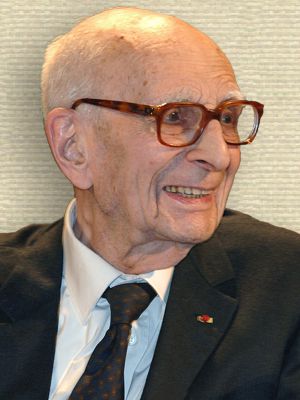
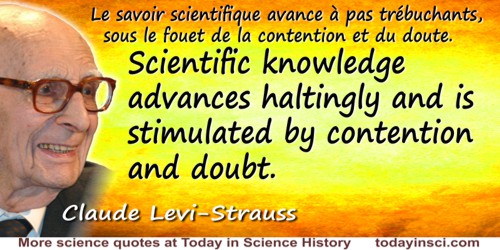
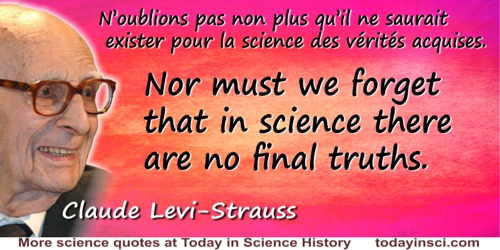
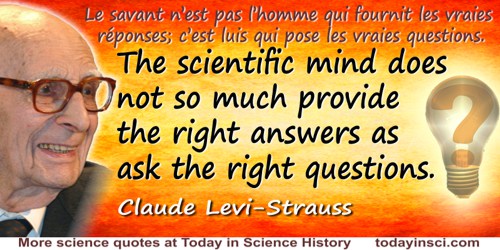
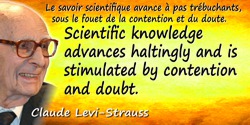
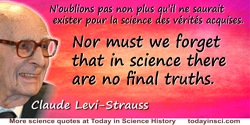
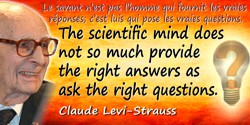
 In science it often happens that scientists say, 'You know that's a really good argument; my position is mistaken,' and then they would actually change their minds and you never hear that old view from them again. They really do it. It doesn't happen as often as it should, because scientists are human and change is sometimes painful. But it happens every day. I cannot recall the last time something like that happened in politics or religion.
(1987) --
In science it often happens that scientists say, 'You know that's a really good argument; my position is mistaken,' and then they would actually change their minds and you never hear that old view from them again. They really do it. It doesn't happen as often as it should, because scientists are human and change is sometimes painful. But it happens every day. I cannot recall the last time something like that happened in politics or religion.
(1987) -- 


